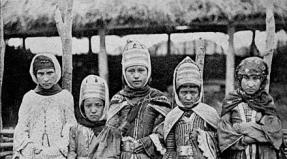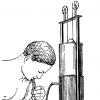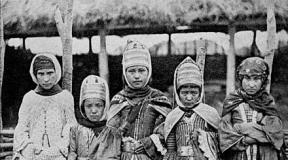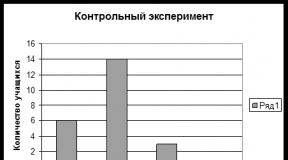Jewish professions. Collection - Jewish wit. Jewish wit. Purely Jewish profession
class="eliadunit">
I want to write about barbers, people in white coats who worked in the bright room of the central hairdressing salon in the city of Derbent. Previously, this room was called "Barbershop". Now the signs are different with the beautiful names “beauty salon”, “miracle of beauty”, “youth salon”. Returning to the past and remembering the times when we lived in our city, sometimes nostalgia for childhood, for classmates, friends and relatives comes.
But the conversation will be about the Jewish profession - hairdresser - about people who were engaged in haircuts, shaving, and also made and sold hairpieces, pedicures and manicures. In the hairdressing salon, which was located in the center of the city of Derbent, there were hairdressers - Mountain Jews - and one Ashkenazi - Uncle Sasha Shainsky. Uncle Sasha spoke excellent Mountain Jewish language. Upon entering the salon, there was a men's haircut and shaving section on the left, and a women's section on the right. The hairdresser worked in two shifts and there were always a lot of people. In the men's department, 5 specialists worked in each shift, and in the women's department - two specialists. I remember the foreman was Safanov Rashi, who in 1970 left with his family for America. Then Miir Besandilov was appointed foreman.
Good specialists in their field worked in this hairdressing salon and they valued their name and did not like entries in the book of complaints that was in the hall. Anyone could make an entry in this book. The barber brigade was a shock worker of communist labor. Socialist competitions were in fashion at that time, and the leaders of each enterprise tried to exceed the plan. Shamayaev Alexander and Mishiev Kolya were older than everyone else in age and were participants in the war. Ilizirov Mushoil, Sasha Shainsky, Azaev Irsil, Benyaminov Sevi, Memriev Sema, Binaev Slavik, Yankilov Edik and others also worked in this salon.
I would like to talk about Kolya Mishiev, a war participant who served in the headquarters carriage and who cut hair for the military. There was an incident in his life at the Mozdok railway station. The Germans attacked by land and air. Bombs were thrown from planes and automatic fire was fired. There was non-stop firing from guns and tanks. The Germans must break off their defenses and seize the oil-producing regions of the country at any cost. The task was set to capture the cities of Grozny and Baku as a military-strategic task and thereby close the fuel tap for the Soviet Army. But the soldiers survived at the cost of enormous sacrifices. And to cheer up the soldiers they published a newspaper. Poems were also published in the newspaper. Four lines remained in the memory of Uncle Kolya’s children:
"Young hairdresser Kolka showed us his skills
Ten Krauts are not polka dots (polka hairstyle)
And he combed his hair under the shelf (drove him into death).”
The client always wanted to get his hair cut by his hairdresser. Sometimes the client left because of the long queue to return later or postponed it until tomorrow, setting a time. People also came from villages and villages. There was a case when a master assigned a man from the village to a student because he was late for the bus, his turn was not coming and he threatened to write a complaint in the book. The visitor said that it seemed to him that they accepted their Jews without waiting in line, but we “foreigners” are not people and are paying with the wrong money. The master answered him that this young man would cut and shave at half the price out of respect for the guest.
The man liked this attitude towards him and even regretted what he said. The student tried to shave as best as possible because he had his first client today. During the entire week, no one contacted the student, although he politely offered his services to everyone. While the student was shaving him, the man thought about his own business and was glad that he had saved money. The student tried to do the job professionally, but in his anxiety, he cut and scratched him on both sides of his face. The man endured, endured, in the hope that he would soon come out from under the boy’s blade, but in the kitchen, where they heated water, the door to the common yard was open, and from there the screams of fighting cats could be heard. The client’s patience ran out, he couldn’t stand it and said: “Listen, dear fellow countryman, do they shave for free in that room?”
The hairdressers said that the student’s face was as white as a sheet and he was ready to pay the client any money so as not to receive complaints from the master. But when he heard the word free from the client, the student burst into laughter with joy and was grateful that the client read his mind.
By the way, they took turns taking breaks and not for long and not because of money, but because they valued the clients’ time. People came to the hairdresser with pleasure, as here they could find out news from the country and from abroad, city news and new funny stories from the lives of familiar people. Here one could hear in the Mountain Jewish language about all the events, as well as about the wars taking place in Israel. People learned about Israel by listening to the voice of America and the BBC in Russian. Specialists from the special services tried to suppress this wave, but the information came through in fragments. I myself have caught this wave more than once in order to understand and understand American politics. I was interested to hear about Solzhenitsyn, Sakharov and many Soviet scientists about whom the voice of America spoke.
One day, a hairdresser cuts the hair of his classmate and old friend and asks him: “Where have you been? I constantly ask my friends about you. Why did you stop coming to me, what’s the reason?” And he answers: “Since I started shaving myself, I saved a lot of money” - “Yes,” the hairdresser agreed. “But since then you are completely unaware of the latest news and jokes.” That’s what the guys joked at the barbershop. jokes and worse.
Indeed, in this salon you could find out about everything and everyone: Who was planning a wedding, who was imprisoned and for what, who got into a fight and who was to blame, who was hanging out with whom, and absolutely everything. All the latest news came out of the barbershop from the Derbent barbers.
When cutting and shaving, the barbers did not let the client get bored and it was as if this conversation was included in the price. And before the haircut they always asked: “How should I cut your hair?” But when they were answered (jokingly): - Silently! - they were offended. They just didn't like to cut their hair in silence. Thanks to these people serving the population, life became more eventful and interesting.
The city was multinational and clients called this salon Jewish. Once they wanted to offend a hairdresser and asked: “Why is the salon called Jewish and not Tat? There is a bookstore next to your salon and all the writers and poets of your nationality write in the Tat language.” They immediately answered with a smile that we don’t do tattoos.
After shaving, the barbers asked: “Should I powder you?” Or spray on cologne (triple cologne or chypre)? People, wise to the barber's jokes, answered - Is this included in the price of shaving? If you received an affirmative answer! They asked me to wrap up powder or perfume for my wife.
Every morning the hairdressers came to work on the first or second shift and they always had many visitors with different personalities. And professional barbers always avoided sharp corners in conversations so as not to offend or offend. In the barbershop they were arguing heatedly about this or that match. My oldest brother is a hairdresser by profession and he often told us interesting stories from his life.
“One day, a football fan - a hairdresser asks a client: “Which football team do you support? He replied: “For the same team as you.” The barber continues: “But you don’t know which team I support.” The client replies: “I’m afraid because you have a sharp razor in your hands.”
The master's clients asked what detergents to use to restore hair, what products are best against dandruff, what shampoos are preferable for oily hair. The hairdresser always had an answer to any questions. Hairdressers came up with different, and sometimes funny, anecdotal methods for restoring and treating scalp on the fly, taking into account the nature of the client’s behavior, and in the end, having talked and laughed a lot, they parted as good friends and happy with each other. A lot of jokes have been made up about hairdressers and many stories are taken from their working lives. Here are some expressions you might hear in a hairdresser:
If you fool me, then I won’t give you the money.
Your machine makes a noise in my ears like a combine harvester
Can you make Muslim's hairstyle so that it lays beautifully?
Make me a cucumber
Make sure you go to the wedding
Your mirror ages me
I want a wavy hairstyle, like a Caspian wave
Make me Alon Dalona style
class="eliadunit">
Why is your hair clipper biting my hair?
Do my hair so that my hair stands up like a soldier on the parade ground
Trim your hair so your ears don't stick out
Don't lift my tanks
Don't take too much from behind because I'm a hippie
Make your bangs so that your brains don't show out
Get a haircut like a “half buck”...
Trim the back and shorten the front, otherwise it’s too long...
Cut off everything that hangs...
Remove the sides so that it doesn't stick out...
Style your hair in such a way that it stays longer...
Cut me off, but not really...
I really wanted to meet you...
How great it felt, as if I had been born again!...
Bring it closer to your head...
Can I urinate myself before getting a haircut?
Well done...
Remove hair by 50%....
Make me a man
Get this mess out of your head...
I just have to trim the front end!
Please don't touch my ass, I always end up doing it myself
Don't do something nasty to my head
Put my household in order
Yosif Besandilov
Current page: 1 (book has 5 pages in total) [available reading passage: 1 pages]
Jewish wit. Purely Jewish profession
* * *
“Sema, look at these calloused hands!” This man doesn’t want to work with his head at all...
Emotional statement
Rabinovich comes to get a job.
The personnel officer asks him:
– Who would you like to work as?
- Director.
- The position is filled.
- Then chief engineer.
– This position is also filled.
- Then a foreman.
- Yes, we have a foreman.
- And the site foreman?
– We don’t need it either.
– Then what can you offer me?
- The work of a concrete worker.
- And what is it?
– Take a shovel and throw the concrete solution into the formwork.
- Excuse me, but is there a shovel with a motor?
- Excuse me, where did you see a shovel with a motor?
- Excuse me, where did you see a Jew with a shovel?
* * *
Two Jews are sitting in the toilet. One asks the other:
– What do you think: is s... mental work or physical work?
– If it was physical work, I would hire a person.
* * *
There are many professions that the children of Israel prefer. But, perhaps, only the synagogue is an exclusively Jewish activity. We can say that only clergy have a purely Jewish profession. The synagogue must have: a rabbi, a chazan, a shames and a shochet.
* * *
Jews are traveling on a train and talking. The first Jew says:
– Do you know that the famous Khazan Rosenfeld in Odessa earned a thousand rubles in a year?
- It can not be!
Third, referring to the first:
– I know that you told the absolute truth, I just mixed it up a little: Rosenfeld lives not in Odessa, but in Kyiv. And he is not a hazan, but runs a furniture factory. And he didn’t earn a thousand rubles, but lost it when there was a fire in the warehouse in the summer.
* * *
The first Hasidic rabbis were modest people, content with little, and anyone could turn to them for help or advice. Their students became venerable, respected people, and there was a whole retinue around them. It was almost impossible to get to the rebbe without greasing the doorkeepers and secretaries.
Shoemaker Chaim tried for a long time to meet the Rebbe, and finally the Rebbe himself went to his shop because the sole of his shoe had come off. While helping the rebbe put on new shoes, the shoemaker complained about the self-will of his assistants.
“I’ve known about this for a long time,” the rebbe threw up his hands, “but I can’t do anything.”
“But you can drive out this rabble and replace them with decent people.”
– How can I allow decent people to turn into rabble?! – the rabbi was indignant.
* * *
The influential Hasidic rebbe spent his days giving visitors advice, predicting fate - and receiving considerable money for it. His servant grumbled that with such income he could be more generous.
- So, maybe you will do the same thing as me? – the rabbi asked mockingly.
- Giving people advice and predicting everything that comes into their heads is not a big trick, I could do that... But taking money for it with a serious face - I don’t think I could handle it.
* * *
A Jewish mathematics student came to a rabbi known for his wisdom and began to ridicule him:
“All your teaching consists of short parables and teachings, but at the university they give me long lectures.” This is because holy teaching is narrow as a mouse hole, but science is wide as the sea!
“It’s said in the Babylonian Talmud,” the rabbi grinned. - “If the straight line (leg) is equal to the cubit, the diagonal (hypotenuse) is equal to the cubit with two fifths.” Wisdom does not require many words, but philosophizing cannot do without it.
* * *
One unbelieving young man came to the rebbe and began to mockingly assert that there is no God.
“If you convince me that God exists, I will recognize you as a great teacher,” he told the rabbi.
“Let me tell you a story,” said the rabbi. “One day a merchant brought home small blacksmith’s bellows, gave them to his cook and said:
“If you need to fan the fire, stretch the bellows like an accordion and the flame will flare up.”
The next day the cook says:
- The bellows don't work.
To prove his words, he started working the bellows, but no fire appeared. The merchant looked into the stove, and there was not a spark, yesterday’s coals had completely gone out. Then he said to the worker:
- How do you want a fire to flare up if there isn’t one at all? There’s not even a spark left, and without it the flame can’t be fanned.” So it is with an unbeliever who does not even admit the thought that God exists,” the rabbi concluded. “If there was even a spark of faith in you, I would help you fan it, but you extinguished it in your soul a long time ago.” Therefore, I will not waste words on you.
* * *
One day Rav Naftali was digging up a vegetable garden. Suddenly the shovel stumbled upon something, and he pulled out from under the ground an ancient bottle sealed with wax. He opened it and a genie jumped out.
- Oh, Naftali! - exclaimed the genie. “I spent 1000 years in this damned bottle and promised myself: whoever lets me out of it, I will serve until the end of his days!” Ask for what you want!
“Get back into the bottle,” the rabbi answered him.
The genie persuaded and seduced him for a long time, but in the end he reluctantly obeyed.
Naftali sealed the bottle tightly, tied a stone to it, went to the seashore and threw the bottle with the genie as far as possible.
- What are you doing?! - his wife attacked him. - Why did you do that? We would live like kings, this genie could fulfill all our desires!
“First of all,” the rabbi answered her, “what kind of genie is this, who in 1000 years is not even able to get out of the bottle?” Secondly, he promised to serve me until the end of my days. What if after some time it seems to him that my days are dragging on too long?
* * *
One young man went to the city, studied to be an engineer and came to the conclusion that there is no God. When he came to visit his parents, the local rabbi asked him to help make a plumbing diagram.
“You know, I don’t believe in God,” the young man reminded.
“And I don’t believe in the God you don’t believe in,” the rabbi reassured him.
* * *
On the way to a Shabbat service, the rebbe meets a young man who defiantly lights a cigarette. The Rebbe stops:
- You, of course, forgot that today is Saturday? - he says affectionately.
- No, I haven’t forgotten.
– Oh, you probably don’t know the law that prohibits lighting a fire on Shabbat?
“Well, come on, I know everything,” the young man objects.
The rabbi raises his eyes to the sky:
- What a righteous young man! He does not want to defile his lips with lies!
* * *
Rebbe Levi Yitzchak loved to watch the people praying in the synagogue. Once, after prayer, he approached the members of the kahal and said loudly: “Hello, hello! Welcome back!" When they looked at him in bewilderment, he said: “You were so far away just recently! You, Shmul, sold hops at the fair, you, Abram, met a ship with grain at the port, and where you were, Yankel, it’s not worth talking about within the walls of our synagogue!”
* * *
Rabbi Chaim of Tsanz said:
– When I was young, I hoped to save the whole world. Then he became a rabbi and hoped to save at least his entire city. Later he became a rebbe and hoped to save his students. Today everyone calls me righteous, but I think: “Maybe I can save myself?”
* * *
The wealthy Jewish community of New York invited the famous cantor Moshe Halbgewax on the occasion of the holidays and raised six thousand dollars for him.
On the eve of his speech, Moshe comes to the rabbi and demands to give him three thousand in advance.
- Moshe! Tomorrow you will have six thousand! Or don't you trust us?
– I trust you, but with money in your pocket it’s much better to sing!
* * *
A certain rather mediocre hazan received an invitation to a remote community on the occasion of a holiday. When he returned, he boasted that he had brought two hundred rubles.
– How is this possible? – Shames was amazed. - You eat like a sick donkey!
- Well, I took a hundred in advance. And the rabbi paid me another hundred so that I wouldn’t go to the police - the Jews there gave me a good beating!
* * *
The place of Khazan became vacant in the community. There are two candidates vying for it, but both have a serious flaw: one is a drinker, the other is weak when it comes to women. They came to the rabbi and asked him to make a decision. He thought for a long time, then said:
- Take the womanizer.
“Rebbe,” a respectable member of the community objects to him indignantly, “an addiction to wine is a much lesser sin!”
- That's how it is! But they are both middle-aged, and the one who drinks more and more over the years, the one who chases women will probably give up this activity one fine day.
* * *
The young man moved to live in Vienna. One day he came to visit his native place and went into the synagogue. Local Jews looked disapprovingly at his haircut and fashionable suit. The young man shrugged his shoulders and said that it was not known how our forefather Abraham dressed. The local rabbi laughed:
“I don’t know what Abraham wore in the land of Israel, but I know exactly how he chose his clothes.” He watched how the goyim dressed, and... dressed differently.
* * *
Before Passover, Rebbe Levi Yitzchak learned that women baking matzah work from early morning until late at night and practically die from fatigue. He immediately summoned the headman and said sternly:
– Anti-Semites slander us as if we are mixing matzah with Christian blood. This is a lie - we are preparing it with Jewish blood.

Rebbe Nahum spoke to the community. People began to complain about numerous troubles and failures. He said this:
– If we could all hang our destinies on a nail, then surely everyone would take up theirs again, because everyone wants someone else’s joy and no one wants someone else’s suffering!
* * *
Rebbe Levi Yitzchak, at the request of the community, went to shame one Jew who began celebrating Purim two weeks before the holiday and ended two weeks after the holiday.
– Why does your Purim last so long? – inquired Rabbi Levi Yitzchak.
– I always thought why the most joyful holiday, Purim, should last only one day? Haman, the wicked man, be damned, decided to destroy the Jews in one day. And when the deal fell through, he probably thought: “Now the Jews will declare this day a holiday. But their fun will last only until the evening.” Well, no, I decided that I would annoy him properly! I will celebrate for a whole month so that the wicked Haman turns over in his grave!
* * *
Hasidim could spend hours analyzing a prayer in search of the hidden meaning. One day they asked Rebbe Boruch:
– Jacob asks the Almighty for “bread to eat and clothing to wear.” Why does he explain why he needs bread and clothing? It is clear that they eat bread and put on clothes.
“It is human nature to be insatiable in one’s needs,” the rebbe answered. - He buys clothes and provisions so that they lie in the pantry. And the forefather Yaakov emphasizes in this way that it is not becoming for a righteous person to desire much.
* * *
One day the rabbi watched members of the community arguing and swearing, interrupting each other, and decided to call them to order.
Having difficulty calming them down, he told them the following story:
In ancient times, a certain king sent a messenger to the king of neighboring lands. The messenger hastily ran into the throne room and, out of breath from the fast ride, began to outline his master’s instructions:
- My master ordered me to tell you to give him... a white horse with a black tail... and if you do not give such a horse, then...
– I don’t want to listen anymore! - the king interrupted the out of breath messenger. - Report to your king that I don’t have such a horse, but if I did, then...
Here he faltered, and the messenger rushed headlong out of the hall. When the king heard such a report, he became terribly angry and declared war on the neighboring king. It lasted a long time - a lot of blood was shed.
Finally, both kings, having exhausted the treasury and exhausted the troops, agreed to a truce and met to discuss their grievances against each other.
When they began negotiations, the second king asked the first:
– What did you want to say with your phrase: “Give me a white horse with a black tail, and if you don’t give it, then...”?
- “...send a horse of a different color, whatever you want.” That's all. What did you want to say with your answer: “I don’t have such a horse, but if I did, then...”?
“...I would certainly send it as a gift to my good neighbor.” That's all.
* * *
The Hasid, known for his mystical fantasies, came to the rebbe from Kobrin with the news:
– I saw the prophet Eliyahu!
- Yes?! – asked the rebbe. -What did he look like? High?
- With a dark face?
- With a ladder and a rope? Yes.
- In a tall hat and boots?
- Calm down, you saw the chimney sweep.
* * *
All members of the small community knew that before dawn their rabbi had disappeared. We tried to look for him, but he was nowhere to be found. The doors of his house remained open; anyone could enter. And so the community members decided that every morning the rebbe goes to heaven, communicates with the heavenly office, so to speak, and they respected him even more. And then a student from Vienna came to the town for vacation. He heard about the rebbe’s morning ascension and let’s laugh, and then he said:
-You are as stupid as chickens. I’ll keep an eye on the rebbe myself, and then I’ll tell everyone where he goes!
That same day, during evening prayer, a student sneaked into the rebbe’s room, crawled under the bed and lay there. I spent the whole night on the hard floor and, of course, didn’t sleep a wink. And when the rebbe got up just before dawn, he was overcome with such fear that he had to clench his teeth tighter. After all, during the day, in the presence of his fellow villagers, he is free to laugh at superstitions, but now... What if angels descend along the lunar path after him and notice a spy?! And they will notice that nothing can be hidden from the angel. In general, while the student was breaking out in a cold sweat, the rebbe quickly performed his ablutions, prayed, then put on peasant clothes and went somewhere.
The student crawled out from under the bed, groaned, rubbed his body, and ran after him.
- He probably went to see some pretty girl! - the young man reasoned. - Yes, it will be a good story!
And so they go out of town. The Rebbe looks closely at the trees, selects one of them, takes out an ax from somewhere and begins to skillfully chop it down. Having felled the tree, he chopped it into logs, chopped them and tied a large neat bundle. With firewood on his back, the rabbi went to a poor neighborhood and knocked on the door of one of the rickety huts.
- Do you need firewood? - asks the rebbe.
“Oh, I don’t even have money,” the woman groans.
However, the rebbe went inside and placed the bundle by the stove. The student carefully looked inside and saw that in the house there were only a sick Jewish woman and two children.
“I’ll lend you a loan, and when your husband returns, you’ll give me six groschen,” says the rabbi.
– What if he doesn’t come back?!
– I am sure that you will pay... You have such a great and omnipotent God and... you don’t trust him?! And you don’t rely on him even for something as little as six pennies?! - the imaginary merchant is indignant.
- Okay, what's your name?
- Petro Kovalchuk. Don't look for me, when you have money, I'll come for it myself. In the meantime, I think I’ll light the stove for you, otherwise you’re so weak that you can’t even lift a log.
The Rebbe put a portion of wood into the stove, but as soon as the fire flared up, he rushed out of the hut headlong and came across a student. He took an unbreakable oath from him that he would not tell anyone what he had learned.
In the afternoon, young yeshiva bochers approached the student and asked: “Does the rebbe ascend to heaven?”
– Maybe even higher! – the student confirmed seriously.
* * *
In one city there lived a rebbe, famous for his wisdom, of venerable age, but very poor. One day the mayor heard about the wisdom of this old man and told him that he wanted to visit him and listen to his words.
- What are we going to treat such a big man with? – his wife asked. “We have almost nothing at home, just a watermelon.”
“You will bring it and do as I tell you,” answered the elder.
When the guest arrived, the old man's wife brought a watermelon. The owner took the watermelon in his hand, felt it with his fingers and said to his wife:
- There is a better watermelon than this. Go and get it.
The wife took the watermelon away, then returned, and she had a watermelon in her hands again. The elder felt this one too and told her to take this one away and bring another one. The wife did not answer and immediately did as he said. This time my husband was pleased. He cut the watermelon and served the treat. After the conversation with the elder, the mayor returned to his place cheerful and pleased with the conversation and the hospitality shown by the sage. He didn’t even know that the rebbe had only one watermelon in his house...
* * *
One Hasidic rebbe once stayed with his friend for three days. When he was about to leave, the owner of the house asked to be excused for not receiving him as he should have.
“Very good,” said the guest, “when you come to me, I will receive you even better.”
Soon a friend visited the rebbe’s house. To his surprise, the guest did not see any special preparations in the house. The owner felt the guest’s bewilderment and said:
“I promised you that I would receive you even better than you received me.” You treated me like a stranger - you carefully prepared for my arrival, and I accepted you as a member of my family.
* * *
In one rich house, two great rabbis met at the table. They didn't exchange a word with each other the entire evening. While seeing one of them off, the owner asks why he didn’t talk to his respected colleague.
“You see, I am a great rabbi, and he is a great rabbi. He knows everything and I know everything. So what should we talk to each other about?!
* * *
Rebbe Zusi had to repay the debt by morning, but there was no money. The disciples pestered him so that he would advise them on how to get money. The Rebbe took a piece of paper and wrote twenty-five ways in which one can quickly get the required amount and gave it to the students. Then he took another piece of paper and wrote another twenty-sixth, but did not show it to the students.
The next morning, a messenger unexpectedly arrived from a man to whom the rebbe had once rendered a great service; as a gift, he gave him a weighty bag of coins. When the money was counted, we realized that this was just the right amount. Then Rabbi Zusya opened a separate piece of paper and showed it to the students. It says: “God does not need the advice of Rabbi Zusi.”
* * *
The rabbi decided to fire the shochet because there were bad rumors about him in the community.
- Well, you can’t trust empty chatter! - the shochet says reproachfully. “These people are slandering your wife too!”
“That’s their business, because I don’t appoint her shochet.”
* * *
The holy “grandfather from Radosice” lived very poorly, his family was starving. They once offered him the position of shoikhet. He took up the book on the laws of shechita.
“A Shoichet must be a God-fearing and decent person,” the rebbe read, sighed, and put the book on the shelf.
– No, this profession is not for me.
* * *
One of the most experienced and devout carvers came to Rabbi Rayatz with a request:
- Rabbi, relieve me of my position, I have decided to change my profession. Last week I was looking through the book "Gakane" (laws of kosher slaughter). So many subtleties and complex rules! I'm afraid that I won't protect myself and break one of them by mistake. It's better to be a shoemaker and sleep peacefully.
- Well, be a shoemaker. But keep in mind that then the Jews will have to buy meat from a butcher who is not afraid to make mistakes and break the law.
So the slaughterer remained a slaughterer.
* * *
On days of remembrance of close relatives, and especially parents, devout Jews read certain prayers. In the synagogue, it was customary for the shames to write down the dates of memorial days and remind them of them for a small fee.
Shames received a generous gift from a wealthy merchant for a reminder of his father's memorial day. A few months later, Shames urgently needed money, and he decided that such a rich and busy man was unlikely to remember the day of his father’s death, so he approached him and told him that today was Remembrance Day. He silently handed Shames a large bill and went deep into prayer.
“He’s very absent-minded,” thought Shames, “which means it’s time to make another day of remembrance for his mother!”
But when he came to the forgetful rich man to inform him about the second day of commemoration of his mother, he began to be indignant:
- Oh, you swindler! As for two fathers, anything is possible, because my mother did not have the best reputation. But so that my mother would not be alone?
* * *
A rabbi and a shames walk through the town. A dog runs out from somewhere, barking loudly. The rabbi picks up his coattails and takes off running.
“Rebbe,” the shames reasoned, “why should we run away?” After all, the Talmud says that a dog will not touch a learned person.
– Are you sure that this dog read the Talmud?
* * *
A rabbi and a shames walk through the forest. Listening to the chirping of birds, Shames said:
– I would like to understand what they say!
– Do you already understand what you yourself say? – the rabbi asked.
* * *
World War I. The officer inspects the synagogue, the shames respectfully accompanies him and gives explanations. After the inspection, he says to Shames (and this happens on Saturday):
“I would give you money, but today is Shabbos and you can’t touch it!”
- Oh, Mister Lieutenant! I will not offend you by refusing five guilders. The Almighty will only be pleased if in war people do nothing worse than touch money on Shabes!
* * *
An eighty-year-old Jew dies. His local ninety-year-old rabbi comes to him and asks:
- How are you feeling, Abram?
– It’s bad, Itzik, very bad. I'll probably see God soon!
- Listen, Abram, if He asks there: “How is Itzik,” then you haven’t seen me for a long time.
* * *
Three rabbis are talking. First:
“One day the hotel where I was staying caught fire. I had to run out in only a shirt, but I had new trousers and a coat made of good wool! But I told myself: everything is according to God’s command! After all, my son sells ready-made dresses...
The second one interrupts him:
– One day a cat fell under my feet and I dropped my watch. But I told myself: everything is according to God’s command! After all, my son is a watchmaker...
The third one also joins the conversation:
“One night a large branch fell on the roof of my house, and I was very scared. But I told myself: everything is according to God’s command! After all, my son owns an underwear factory...
* * *
By the road, the driver is tinkering with the truck's engine. From under the hood comes:
- Well... fuck your mother! Well, it's just... damn it!
A rabbi walks by. He comes up and says to the driver:
- Why are you fighting? Cursing won't help you.
“Nothing will help here, rabbi.” I've been struggling for two hours now.
“Why don’t you say a prayer?” Still, it's better than swearing.
“What, Rabbi, do you think that if I pray, this jalopy will start and drive?”
– What do you have to lose? Prayer has never harmed anyone.
The driver sits in the cab, raises his eyes to the sky and says:
“King of kings, please, make sure this kerosene stove starts.”
Then he turns the key, presses the pedals, and the truck takes off. The rabbi was stunned:
- Well, it’s just... damn it!
* * *
The God-fearing rabbi fell ill and invited a doctor. He looked at him and, hiding his eyes, said:
“I need to rely on God so that everything ends well.”
“I can trust in God without you,” the rabbi remarked sternly.
* * *
The famous Rabbi Hayes in his youth was considered a freethinker and often argued with famous authorities. The Lvov rabbi could not decide for a long time to give him the community, and then the old shames warned him:
- Appoint Hayes as a rabbi quickly, otherwise, with his scholarship and desire for debate, he will soon become a priest!
* * *
Rebbe Avraham Yakov from Sadigura was arrested on suspicion of anti-government activities and put in a cell with “politicals.”
A prominent local lawyer came to see one of the prisoners. He recognized the rebbe and was terribly surprised:
– What do you have to do with the fight against the monarchy? Have you joined the party?!
“I don’t know any party, but the explanation for the fact that I am considered a political criminal can be found in the Torah.” Remember how Joseph, the son of Jacob, was also imprisoned with the “politicals,” in “the place where the king’s enemies sit.” Kings always doubt the loyalty of those who are loyal to the authority of the King of kings - the Most High. To them, it's like a potential rebel.
* * *
Several Jews were having lunch at the same table in a hotel and, as often happens, they started talking about whose rabbi was better.
One of them said that for five years he and his wife had no children, and only thanks to the blessing of the rabbi they found the desired heir. Another said that his son took a crooked path, and only the rabbi’s blessing brought him back home. The third said that the rabbi blessed his risky deal, he invested all his capital in it and went broke.
– What is the miracle? - asked the listeners.
“The miracle is,” he answered, “that I retained faith in God and in my rabbi.”
* * *
Rebbe Menachem Mendel of Kotzk said:
“I am sure that if all the wise men and righteous people of Israel agreed among themselves and set the day when Moshiach would come, if they put on festive clothes and went out to meet him, the Almighty would not disgrace them and would send Moshiach to them. But here’s the problem: only Moshiach can make sure that all the wise men and righteous people of Israel agree on something among themselves!
* * *
A tax inspector came to the Berdichev synagogue.
- So... So you light candles, the wax floats, where do you put the floats?
Rabbi says:
“We send them to the workshop, where they melt them down and send us new candles.” Here are the invoices.
- I see... But you sell matzah. Crumbs remain. Where do you put these crumbs?
Rabbi says:
– We send it to a subsidiary farm. They feed the chickens that are sent to our kitchen. Here are the acts.
“Okay...” the inspector doesn’t let up. - But you are doing circumcision. You are left with scraps. Where do you put these scraps?
- We're going to the city...
- So what? What do they send you?
- All sorts of shit, they sent you today...
* * *
The chief rabbi of Odessa, Shimon-Arie Schwabher, was not distinguished by his knowledge of the Torah and his concern for the well-being of the community, but he was loyal to the authorities and willingly communicated with Orthodox priests. Even in his appearance, he resembled a priest more than a rabbi: always clean-shaven, he wore a black robe with a white collar and tie. At one point, he decided that he should be given the same insignia as high-ranking clergy of the Christian faith. He demanded from the city authorities a lacquered carriage drawn by four stallions. They decided that the Jew had gone too far and responded like this:
– You want to be honored as a priest. But the priest takes a vow of celibacy, and you are married. Choose: wife or crew?
* * *
The Hasidim especially revered the Apt Rebbe Abraham Yeshua Eshel. When he went to visit another community, crowds of people followed his carriage, wanting to see the great righteous man. The humble rebbe was tired of such excitement. One day he came incognito to a small place with his son, but people found out about this and came out to honor him.
- Oh God, what have I done wrong to you?! – the rabbi moaned bitterly.
His young son shrugged.
“Calm down, father, all these people don’t pay the slightest attention to you.” They came to see me!
- Why do they want to see you? – the rabbi was amazed.
- How? After all, I am the son of the righteous man from Apta!
* * *
One person asked the Baal Shem:
– What is more important and valuable: wealth or wisdom?
The Baal Shem laughed and said:
– Of course, wisdom is more significant and more valuable.
The man said:
“Then, Baal Shem, tell me, why do you, a wise man, go to the houses of rich people, but I have never seen rich people go to your house?”
The Baal Shem smiled and said:
– Yes, wise people go to the rich because they are wise and know the value of wealth, and the rich cannot always understand the value of wisdom, but this is how the world works, and there is no injustice in it.
* * *
A traveling preacher, known for his theological erudition, bad character and ugly lifestyle, came to Berdichev. As is customary, before delivering a sermon, he came to Rabbi Levi Yitzchak for permission.
He, of course, did not give permission.
- Why?! - the preacher was indignant, - I don’t add anything on my own, I give only “kosher” quotes.
“You know,” the rabbi answered, “we have a law: if you cook kosher meat in a treph cauldron, it will also become treph.”
* * *
One of the favorite topics for jokes and tales is a duel between ministers of different cults.
* * *
The priest says to the rabbi:
“You are a simple rabbi and you will die as a rabbi.” And I hope to eventually become a bishop.
– A bishop can become a cardinal!
- Well... the cardinal can become a pope.
- How can I say... One of our boys got out...
* * *
One day, Rabbi Levi Yitzchak was walking in the company of a Catholic priest. Suddenly they see a Jewish cab driver loudly saying the words of prayer and at the same time lubricating the wheel with tar.
“You see what your Jews are like!” – the priest said maliciously.
The Tsadik smiled a bright smile:
– Yes, the Jews are truly an amazing people! They pray even when they are adjusting the wheel to the cart!!
* * *
A rabbi and a priest are talking.
The priest is red-haired, and the rabbi is completely bald. And so the priest with a feeling of superiority says:
- What, God didn’t give you hair?
The rabbi answers:
“God gave only redheads, but I didn’t take them...
* * *
The rabbi is sailing on a ship. A fellow traveler, a pastor, approaches him:
- Listen carefully! Our ship is one hundred meters long and fifty meters wide. Guess how old the captain is?
- Give me ten minutes to find the answer.
The allotted time has not yet expired when the rabbi appears at the buffet:
- He's fifty.
- How did you calculate this?
- Did you figure it out?! Yes, I ran and asked him.
* * *
A rabbi and a priest are talking.
– This celibacy of yours is a terrible thing! – the rabbi waves his hands. “With the blessing of the Almighty, I share a bed with a woman, and she gives birth to my sons!”
Pater thought:
– And your faith forbids eating pork.
The rabbi smiles slyly:
– I’ll tell you honestly, when I was young and stupid, I once ate a piece of ham.
- And how, the food is excellent, rebbe?
- I won’t deny it. But tell me, father, only honestly, as a clergyman to a clergyman: have you ever slept with a girl?
- Well, frankness for frankness - when I was young and intemperate, I once slept with a girl.
- So how is it? Admit it, father, it’s better than pork...
* * *
The priest says to the rabbi: “What kind of funeral do you have: they sprinkle ashes on their heads, cry, scream, or is it the case with us: everyone sings and drinks.”
The rabbi nods in agreement: “Yes, I also like it better when your people are buried.”
* * *
The rabbi comes to the priest, holds out the painting “The Last Supper” and asks:
- Are these your guys?
- Well, ours...
- Then pay for dinner!
* * *
One day the rabbi and the priest were watching the children playing hide and seek. One of the boys hid, but the other did not even think to look for him, instead he ran off to play in another place. The priest laughed and pointed to the hiding boy:
- These are stupid children! No one is looking for him!
To which the rabbi replied:
“We adults are no better.” After all, God says the same thing: “I hid myself, but no one wants to look for Me.”
* * *
The Catholic priest meets little Isaac and, wanting to show the advantage of his church school, tells him:
Attention! This is an introductory fragment of the book.
If you liked the beginning of the book, then the full version can be purchased from our partner - the distributor of legal content, LitRes LLC.
Jewish wit. Purely Jewish profession
* * *“Sema, look at these calloused hands!” This man doesn’t want to work with his head at all...
Emotional statement
Rabinovich comes to get a job.
The personnel officer asks him:
– Who would you like to work as?
- Director.
- The position is filled.
- Then chief engineer.
– This position is also filled.
- Then a foreman.
- Yes, we have a foreman.
- And the site foreman?
– We don’t need it either.
– Then what can you offer me?
- The work of a concrete worker.
- And what is it?
– Take a shovel and throw the concrete solution into the formwork.
- Excuse me, but is there a shovel with a motor?
- Excuse me, where did you see a shovel with a motor?
- Excuse me, where did you see a Jew with a shovel?
* * *Two Jews are sitting in the toilet. One asks the other:
– What do you think: is s... mental work or physical work?
– If it was physical work, I would hire a person.
* * *There are many professions that the children of Israel prefer. But, perhaps, only the synagogue is an exclusively Jewish activity. We can say that only clergy have a purely Jewish profession. The synagogue must have: a rabbi, a chazan, a shames and a shochet.
* * *Jews are traveling on a train and talking. The first Jew says:
– Do you know that the famous Khazan Rosenfeld in Odessa earned a thousand rubles in a year?
- It can not be!
Third, referring to the first:
– I know that you told the absolute truth, I just mixed it up a little: Rosenfeld lives not in Odessa, but in Kyiv. And he is not a hazan, but runs a furniture factory. And he didn’t earn a thousand rubles, but lost it when there was a fire in the warehouse in the summer.
* * *The first Hasidic rabbis were modest people, content with little, and anyone could turn to them for help or advice. Their students became venerable, respected people, and there was a whole retinue around them. It was almost impossible to get to the rebbe without greasing the doorkeepers and secretaries.
Shoemaker Chaim tried for a long time to meet the Rebbe, and finally the Rebbe himself went to his shop because the sole of his shoe had come off. While helping the rebbe put on new shoes, the shoemaker complained about the self-will of his assistants.
“I’ve known about this for a long time,” the rebbe threw up his hands, “but I can’t do anything.”
“But you can drive out this rabble and replace them with decent people.”
– How can I allow decent people to turn into rabble?! – the rabbi was indignant.
* * *The influential Hasidic rebbe spent his days giving visitors advice, predicting fate - and receiving considerable money for it. His servant grumbled that with such income he could be more generous.
- So, maybe you will do the same thing as me? – the rabbi asked mockingly.
- Giving people advice and predicting everything that comes into their heads is not a big trick, I could do that... But taking money for it with a serious face - I don’t think I could handle it.
* * *A Jewish mathematics student came to a rabbi known for his wisdom and began to ridicule him:
“All your teaching consists of short parables and teachings, but at the university they give me long lectures.” This is because holy teaching is narrow as a mouse hole, but science is wide as the sea!
“It’s said in the Babylonian Talmud,” the rabbi grinned. - “If the straight line (leg) is equal to the cubit, the diagonal (hypotenuse) is equal to the cubit with two fifths.” Wisdom does not require many words, but philosophizing cannot do without it.
* * *One unbelieving young man came to the rebbe and began to mockingly assert that there is no God.
“If you convince me that God exists, I will recognize you as a great teacher,” he told the rabbi.
“Let me tell you a story,” said the rabbi. “One day a merchant brought home small blacksmith’s bellows, gave them to his cook and said:
“If you need to fan the fire, stretch the bellows like an accordion and the flame will flare up.”
The next day the cook says:
- The bellows don't work.
To prove his words, he started working the bellows, but no fire appeared. The merchant looked into the stove, and there was not a spark, yesterday’s coals had completely gone out. Then he said to the worker:
- How do you want a fire to flare up if there isn’t one at all? There’s not even a spark left, and without it the flame can’t be fanned.” So it is with an unbeliever who does not even admit the thought that God exists,” the rabbi concluded. “If there was even a spark of faith in you, I would help you fan it, but you extinguished it in your soul a long time ago.” Therefore, I will not waste words on you.
* * *One day Rav Naftali was digging up a vegetable garden. Suddenly the shovel stumbled upon something, and he pulled out from under the ground an ancient bottle sealed with wax. He opened it and a genie jumped out.
- Oh, Naftali! - exclaimed the genie. “I spent 1000 years in this damned bottle and promised myself: whoever lets me out of it, I will serve until the end of his days!” Ask for what you want!
“Get back into the bottle,” the rabbi answered him.
The genie persuaded and seduced him for a long time, but in the end he reluctantly obeyed.
Naftali sealed the bottle tightly, tied a stone to it, went to the seashore and threw the bottle with the genie as far as possible.
- What are you doing?! - his wife attacked him. - Why did you do that? We would live like kings, this genie could fulfill all our desires!
“First of all,” the rabbi answered her, “what kind of genie is this, who in 1000 years is not even able to get out of the bottle?” Secondly, he promised to serve me until the end of my days. What if after some time it seems to him that my days are dragging on too long?
* * *One young man went to the city, studied to be an engineer and came to the conclusion that there is no God. When he came to visit his parents, the local rabbi asked him to help make a plumbing diagram.
“You know, I don’t believe in God,” the young man reminded.
“And I don’t believe in the God you don’t believe in,” the rabbi reassured him.
* * *On the way to a Shabbat service, the rebbe meets a young man who defiantly lights a cigarette. The Rebbe stops:
- You, of course, forgot that today is Saturday? - he says affectionately.
- No, I haven’t forgotten.
– Oh, you probably don’t know the law that prohibits lighting a fire on Shabbat?
“Well, come on, I know everything,” the young man objects.
The rabbi raises his eyes to the sky:
- What a righteous young man! He does not want to defile his lips with lies!
* * *Rebbe Levi Yitzchak loved to watch the people praying in the synagogue. Once, after prayer, he approached the members of the kahal and said loudly: “Hello, hello! Welcome back!" When they looked at him in bewilderment, he said: “You were so far away just recently! You, Shmul, sold hops at the fair, you, Abram, met a ship with grain at the port, and where you were, Yankel, it’s not worth talking about within the walls of our synagogue!”
* * *Rabbi Chaim of Tsanz said:
– When I was young, I hoped to save the whole world. Then he became a rabbi and hoped to save at least his entire city. Later he became a rebbe and hoped to save his students. Today everyone calls me righteous, but I think: “Maybe I can save myself?”
* * *The wealthy Jewish community of New York invited the famous cantor Moshe Halbgewax on the occasion of the holidays and raised six thousand dollars for him.
On the eve of his speech, Moshe comes to the rabbi and demands to give him three thousand in advance.
- Moshe! Tomorrow you will have six thousand! Or don't you trust us?
– I trust you, but with money in your pocket it’s much better to sing!
* * *A certain rather mediocre hazan received an invitation to a remote community on the occasion of a holiday. When he returned, he boasted that he had brought two hundred rubles.
– How is this possible? – Shames was amazed. - You eat like a sick donkey!
- Well, I took a hundred in advance. And the rabbi paid me another hundred so that I wouldn’t go to the police - the Jews there gave me a good beating!
* * *The place of Khazan became vacant in the community. There are two candidates vying for it, but both have a serious flaw: one is a drinker, the other is weak when it comes to women. They came to the rabbi and asked him to make a decision. He thought for a long time, then said:
- Take the womanizer.
“Rebbe,” a respectable member of the community objects to him indignantly, “an addiction to wine is a much lesser sin!”
- That's how it is! But they are both middle-aged, and the one who drinks more and more over the years, the one who chases women will probably give up this activity one fine day.
* * *In Yiddish, the synagogue was called “shul,” literally “school.” The duties of the minister, among other things, usually included calling parishioners to prayer in the morning. To do this, he walked around the place and knocked on the shutters - and therefore his position was often called in Yiddish “ shulklapper", from "shul" ("synagogue") + "klapn" ("knock"), in southern dialects - " shilllopper", and from this word the corresponding surname was also formed.
- Sho(y)het- from a Hebrew word meaning “one who carries out the slaughter of livestock in accordance with the requirements of Judaism.” This is a word with the suffix “-er”, in the form “ miner", penetrated into the German language (where it was applied exclusively to Jews) and in this form also became a surname. In Ukraine and Belarus, the surrounding Slavic population called livestock slaughterers with the word “slaughterer”, and from this word the surnames were formed Reznik, Reznikov, Reznichenko etc. Occasionally, the surname Reznik and derivatives are also found among Ukrainians.
- Menaker- a person who cleans the back of the carcass from veins and internal fat that are forbidden (according to the rules of kashrut) for food.
- Bo(d)dec(from the Hebrew word meaning "inspector") Spector(corrupted Polish "inspector") - a person who checks an already slaughtered animal to ensure it meets kosher conditions.
Surnames denoting religion-related professions also include some abbreviated surnames:
- Shub- “shohet u-vodek” - “cutter and checker” (in the sense of “checking the correctness of kosher meat”).
- Shur- “shohet ve-rav” - “slaughterer and rabbi.”
- Schatz- “shliach-tzibbur” - literally “messenger of the community”, this term was used to call a cantor.
- Shabad- “shliach bet-din” - “envoy of the (rabbinical) court.”
- Rock- "rosh kehillah" - "head of the community."
- Romm(originally it was Rum) - "rosh metivta", "head of the yeshiva" ("metivta" is an Aramaic term equivalent to the Hebrew word "yeshiva").
- Rabad- "rosh bet din" - "head of the (rabbinical) court."
- Dats- “dayan tzedek”, “righteous judge”.
Surnames derived from general professions
Like other nations, among Jews a significant part of surnames are derived from the names of professions or occupations.
As specifically Jewish aspects of Jewish surnames derived from the names of professions, the following points can be noted.
Firstly, the composition of the general “list” of such surnames was affected by the peculiarities of the position of Jews in the economic system of the peoples among whom the Jews lived. Therefore, among Jewish surnames there are relatively many surnames associated with trade and very few surnames associated with agriculture (Jews were predominantly urban residents).
Secondly, Jews, especially in Eastern Europe, used several languages - both Hebrew and the language (and sometimes several languages) of the surrounding population, and often also one of the Jewish languages of the diaspora (Yiddish or Ladino). In addition, Jews often had to move from one country to another (or, in multinational empires, from an area inhabited by one people to an area inhabited by another). This led to the fact that surnames from the same profession could be formed using words from different languages, and sometimes using a stem from one language and an ending from another. So, in the same city of the Russian Empire, bearers of surnames could turn out to be neighbors Hayat(Hait), Schneider, Tailor, Kravets, Kroitor, and also, say, Schneiderov And Portnov. All the surnames in this example are derived from words meaning “tailor”, but in different languages - the word “hayat” means “tailor” in Hebrew, “schneider” in Yiddish and German, “krawiec” in Polish, and “ kroitor" - in Romanian. At the same time, the surname Shneiderov is formed from a word in the Yiddish language using the Russian family ending -ov, and the surname Portnov is formed according to the usual model for Russian surnames, and many Russians have exactly the same surname. The situation is similar with surnames formed from words meaning “shoemaker” - among Jews you can meet people by the surname Sandler(from Hebrew "sandlar"), Shuster(from a German word or a Yiddish word), Shoemaker And Sapozhnikov(from the Russian word), Chizmaru(from Romanian).
In most cases, Jewish "professional" surnames are simply the name of a profession, regardless of the language from which the corresponding word is taken. However, family endings were sometimes used, especially in some areas of the Russian Empire. This is how the surnames mentioned above arose ( Sapozhnikov, Portnov, Schneiderov) and some others, for example, Botvinnikov(from the Belarusian “botvinnik” - “greengrocer”), Rybakov, Vinokurov, Glezerov(from the German “glazer” or Yiddish “glezer” - “glazier”), Kramarov(from the German “kramer” - “shopkeeper”), etc. In the last two examples, the Russian ending “-ov” is added to the German or Yiddish base. (Last names Kramer And Glaser exist in the original German-Yiddish form, without ending). Sometimes the Ukrainian formant “-enko” was also used ( Kushnirenko from the Ukrainian “kushnir” - “furrier”, Shklyarenko- from the Polish “shklyar” - “glazier”)
Sometimes the formant “-man” (“man”) was added to the surname, especially those based on Yiddish or German, and this is how surnames arose Gendlerman(from “gendler” - “trader, peddler”), Shusterman(“Shuster” - “shoemaker”), Shneiderman(“Schneider” - “tailor”), etc. However, the same formant can be directly part of the name of the profession, for example, surname Furman means “cart driver” (from the German Fuhre - “cart”), and the surname Kaufman(with options Koyfman etc.) means “merchant”, from the German kaufen (“koifn” in Yiddish).
If this profession was not the first bearer of the surname, but his father, then the German formant “-zon/son” could be used to form the surname ( Preigerzon from “preger” - “chaser”, Gleerson etc.) or the Slavic formant “-ovich” ( Blyakherovich from “blyakher” - “tinsmith”, Kushnirovich from “Kushner” - “furrier”, Khaitovich from “hayat” - “tailor” in Hebrew, etc.)
Sometimes the formant “-sky” was used to form a “professional” surname ( Kofmansky, Kotlyarsky and etc.)
Surnames derived from the names of professions cover almost the entire spectrum of Jewish economic activity. These are also the professions of artisans: tinsmith ( Bleher, Blecherman, Blyakher, and Kanegieser/Kanegiesser And Klempner), coppersmith ( Kuperschmid- from the German word, Moseonnik- from the Polish word), bookbinder ( Buchbinder), printer ( Drucker) etc., and professions such as porter ( Treger, Treyger) and water carrier ( Wasserman- from the German word, Sacagiu- from Romanian), and surnames associated with medicine ( Rofe, Roiphe- from the Hebrew word meaning "doctor", as well as Doctor, Doctors, Paramedic, Paramedics, And Shpitalnik- from the Polish word meaning “worker in a hospital for the poor”), and the names of the musicians ( Kleizmer- in Yiddish this word means “musician”, Musician, Zimbalist, Geiger- from the German word meaning "violinist"). There are names of the builders ( Steiner- from a German word meaning “bricklayer”, A carpenter etc.) and factory workers ( Gisser- "foundry worker" Gamarnik- "smelter" Dreyer, Drexler, Toker, Turner- “turner”). There are surnames associated with jewelry ( Goldschmid, Silberschmidt- from German words meaning “gold/silversmith”, Tsoref- from the Hebrew word meaning "jeweler" Shlifer And Steinshlifer- from the German word meaning “cutter”).
Many Jewish surnames are associated with trade - Kramer("shopkeeper"), Gendler(“trader”, often indicating specialization - Buchgendler"bookseller" Weizgendler"grain merchant" Mitzengendler"hat merchant") Magaziner(shop owner) Meckler("broker"), Factor(“intermediary”), Soyher(“merchant”, a Yiddish word of Hebrew origin), Kaufman/Koifman, Kupchik and many others.
Quite a few surnames are associated with distillation and wine trading (in Eastern Europe there were many Jews in this sector of the economy) - Vinnik, Distiller, Schenker(“shinkar”, with variations of the surname Shenkar, Weinshenker, Sheinkman and etc.), Korchmar And Kretschmer(“korchmar”, in Yiddish - “kretschmer”), Distiller(from the Romanian word meaning "distiller"), Guralnik(from a Ukrainian word also borrowed into Yiddish), Gorelik, Liquornik(from the Polish word), Breuer(from a Yiddish word) and others.
There are relatively few surnames associated with agriculture, since Jews in Europe were predominantly urban dwellers. Nevertheless, there are still such names - Boyer("peasant"), Ackerman("farmer") Rolnik(from the Polish word meaning "peasant"), Schaefer("shepherd").
Surnames derived from the names of professions were common among Jews in all countries. Thus, among Jews in Arab countries such surnames were common as Albahri("sailor"), Amar("builder"), Aseraf(“as-saraf” means “money changer” in Arabic), Albaz("falconer"), Hadad("blacksmith"), Asayag(“as-sayag”, “jeweler”), Faraj("healer"), Fahima("coal merchant"), Najjar("a carpenter"), Sebag(“dyer”), etc. A common surname among Jews in the Middle East Turge(e)man means "translator". Crimeans have surnames such as Bakshi(Turkic word meaning “teacher”), Biberji(“growing pepper”), Penergy(cheese maker), etc., Jews in the territory of the former Ottoman Empire - along with surnames based on the Arabic language - have such Turkic-language surnames as Kababchi(“kebab seller”), Kundarchi("shoemaker"), Saachi("watchmaker"), Tanakci("tinsmith").



















